AIML API - Product Review

AIML API Product Overview
AIML API is a game-changing platform for developers looking to tap into the world of AI. It’s a one-stop shop for accessing over 100 AI models through a single, easy-to-use API. This service is perfect for coders, startups, and big companies alike who want to add AI smarts to their projects without the usual hassles.
What makes AIML API stand out? For starters, it’s built on serverless tech. This means you don’t have to worry about managing servers or dealing with complex setups. It’s all about making your life easier so you can focus on creating cool stuff. The platform offers a wide range of AI models, covering everything from chat and language processing to image generation and code assistance. And here’s the kicker – it’s designed to work seamlessly with existing OpenAI applications.
So if you’re already using OpenAI, switching to AIML API is a breeze. AIML API isn’t just about variety; it’s about performance too. They promise 99% uptime and claim to be three times faster than standard APIs. Plus, they’re big on keeping costs down. Their pricing is straightforward and predictable, and they say they offer the lowest rates in the market.
For developers who love to keep an eye on things, AIML API provides real-time tracking of API calls and token usage. It’s all about giving you the tools to build smarter, faster, and more efficiently.
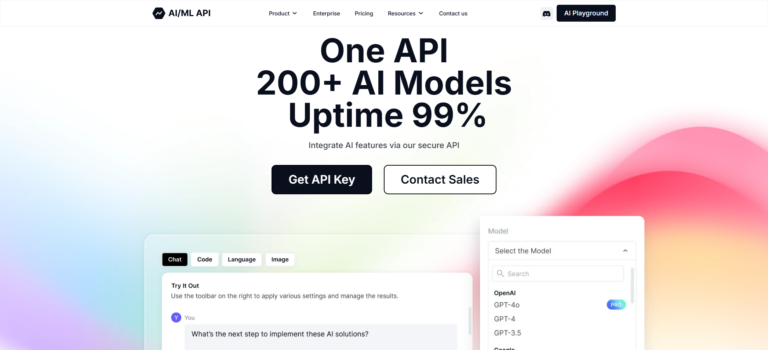
AIML API User Interface and Experience
AIML API’s user interface is clean and straightforward. It’s built with developers in mind, so you won’t find any flashy graphics or unnecessary bells and whistles. Instead, you get a no-nonsense dashboard that puts the important stuff front and center. When you log in, you’ll see your API usage stats right away. This is super handy for keeping track of how many tokens you’re using and making sure you’re staying within your plan limits.
The dashboard also shows you which models you’re using most often, giving you a quick overview of your AI activities. One of the best things about AIML API is how easy it is to get started. If you’ve used OpenAI before, you’ll feel right at home. They’ve designed their API to be compatible with OpenAI’s structure, so you can often switch over with just a single line of code change. This is a huge time-saver for developers who are already familiar with OpenAI. The documentation is clear and well-organized. You’ll find plenty of code examples and explanations to help you integrate the API into your projects. Whether you’re working with chat models, image generation, or code assistance, the docs provide step-by-step guides to get you up and running quickly.
For those who like to keep a close eye on things, AIML API offers real-time tracking of your API calls and token usage. This feature is a godsend for managing costs and optimizing your AI usage. You can see exactly how your resources are being used, which helps with budgeting and planning. The platform supports a wide range of programming languages, so you’re likely to find support for your preferred tech stack. This flexibility makes it easier to integrate AIML API into existing projects without having to learn a whole new set of tools.
One minor gripe some users have is that the interface could use a bit more polish in terms of design. It’s functional, but it might not win any beauty contests. However, for most developers, the focus on functionality over form is probably a plus. Overall, the user experience with AIML API is smooth and developer-friendly. It’s clear that a lot of thought has gone into making the platform as accessible and easy to use as possible, while still providing powerful AI capabilities.
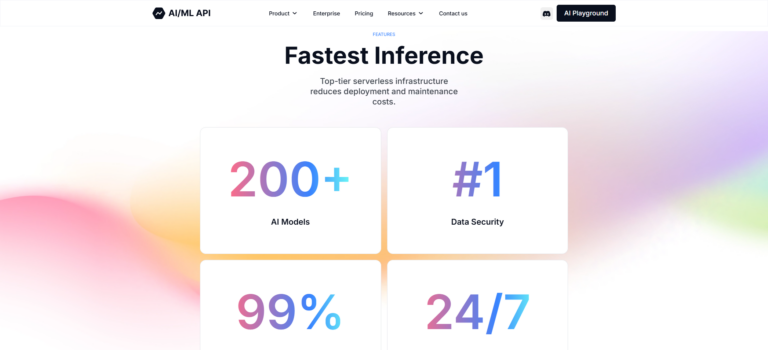
AIML API Key Features and Functionality
AIML API offers a robust set of features designed to make AI integration smooth and efficient for developers. Let’s dive into the main features and how they work:
Access to 200+ AI Models
AIML API provides a vast library of over 200 AI models covering various domains. This includes:
- Chat models for building conversational agents
- Image generation models for creating visuals
- Video and 3D generation models
- Code models for programming assistance
- Genomic and voice processing models
These models are continuously updated, ensuring users have access to the latest AI innovations. The benefit here is versatility – developers can find models suited for almost any AI task they need to tackle.
Serverless Infrastructure
AIML API runs on a serverless architecture. This means:
- No need to manage or maintain servers
- Automatic scaling to handle traffic spikes
- Reduced operational costs
The serverless setup allows developers to focus on building their applications without worrying about infrastructure management. It also ensures high performance and low latency, even under heavy loads.
OpenAI Compatibility
The API is designed to be compatible with existing OpenAI applications. This feature allows for:
- Easy transition from OpenAI to AIML API
- Minimal code changes required
- Familiar structure for OpenAI users
This compatibility reduces the learning curve and integration time for developers already using OpenAI, making the switch to AIML API nearly seamless.
AI Playground
AIML API offers an AI Playground, a sandbox environment where users can test models before deployment. This feature:
- Allows real-time model testing
- Helps in selecting the right model for specific use cases
- Reduces integration risks
The AI Playground is a valuable tool for developers to experiment with different models and ensure they fit their needs before committing to full integration.
High Performance and Uptime
AIML API boasts impressive performance metrics:
- 99% uptime guarantee
- Three times faster response rates compared to standard APIs
This high reliability and speed ensure that applications built with AIML API can operate smoothly and efficiently, providing a better user experience.
Real-time Tracking and Analytics
The platform provides real-time tracking of API calls and token usage. This feature:
- Helps manage costs effectively
- Provides insights into API usage patterns
- Assists in optimizing resource allocation
Real-time analytics allow developers to keep a close eye on their API usage, helping them make informed decisions about scaling and resource management.
Simple Pricing Structure
AIML API offers a straightforward pricing model. Benefits include:
- Predictable costs
- Claimed to be the lowest rates in the market
- Flexible plans to suit different needs
The simple pricing structure helps businesses budget effectively and avoid unexpected costs associated with AI integration. By combining these features, AIML API aims to provide a comprehensive, user-friendly, and cost-effective solution for integrating AI capabilities into various applications and services.

AIML API Performance and Accuracy
AIML API boasts impressive performance metrics and accuracy levels, making it a strong contender in the AI model marketplace. Let’s break down its strengths and areas for improvement:
Speed and Responsiveness
AIML API claims to be three times faster than standard APIs. This speed boost is a significant advantage for developers working on time-sensitive applications. The platform’s serverless infrastructure contributes to this quick response time, allowing for rapid scaling during high-demand periods. Users report consistent performance across various model types, from chat and language processing to image generation. However, as with any cloud-based service, occasional latency issues may occur during peak usage times.
Accuracy
The accuracy of AIML API’s models is generally on par with industry leaders. For instance, their chat models are said to achieve GPT-4 level accuracy at a fraction of the cost. This high accuracy extends to other model types as well, including image generation and code assistance. It’s worth noting that accuracy can vary depending on the specific model and use case. Some users have reported that certain specialized tasks may require fine-tuning or additional prompting to achieve optimal results.
Uptime and Reliability
AIML API promises a 99% uptime guarantee, which is crucial for businesses relying on AI for critical operations. This high availability ensures that developers can build applications with confidence, knowing the API will be accessible when needed.
Scalability
The platform’s serverless architecture allows for excellent scalability. It can handle sudden spikes in traffic without performance degradation, making it suitable for both small startups and large enterprises.
Areas for Improvement
While AIML API performs well overall, there are a few areas where it could potentially improve:
- Model Customization: Some users have expressed a desire for more options to fine-tune models for specific use cases.
- Documentation: While generally good, the documentation could be more comprehensive, especially for advanced use cases and troubleshooting.
- Error Handling: A few users have mentioned that error messages could be more detailed to help with debugging.
- Model Updates: Keeping up with the rapid pace of AI development, some users hope for even faster integration of the latest models.
Limitations
It’s important to note that AIML API, like all AI services, has some inherent limitations:
- Data Privacy: Users handling sensitive data should be aware of the platform’s data handling practices.
- Language Support: While extensive, the language support may not cover all niche languages or dialects.
- Complex Tasks: Very specialized or complex tasks might require additional engineering or multiple API calls to achieve desired results.
Overall, AIML API delivers strong performance and accuracy, positioning itself as a reliable and cost-effective solution for AI integration. Its limitations are generally in line with industry standards, and the team seems committed to continuous improvement and expansion of their offerings.

AIML API Pricing and Plans
AIML API offers a straightforward pricing structure with different tiers to suit various needs and budgets. Let’s break down the available plans:
Free Tier
AIML API provides a free tier for users to test the waters:
- Access to all models, including Pro models
- Limited to 10 requests per hour
- Great for initial testing and small projects
Start-Up Plan
- Price: $4.99 per week
- 10 million AI/ML Tokens
- Features:
- OpenAI compatibility
- Serverless access
- Ideal for small teams and early-stage startups
Growth Plan
- Price: $99.50 per month
- 200 million AI/ML Tokens
- Additional features:
- Priority support
- Crypto payment option
- Perfect for growing businesses with increasing AI needs
Enterprise Plan
- Price: $999.50 per month
- 2 billion AI/ML Tokens
- Premium features:
- Personal manager
- Priority in feature requests
- Designed for large-scale operations and high-volume users
Each plan offers access to over 100 AI models, including chat, image generation, and code assistance. The main differences lie in the number of tokens provided and the level of support. It’s worth noting that AIML API claims to offer the lowest rates in the market. They emphasize predictable pricing, which can be a big plus for businesses trying to manage their AI-related expenses. For those unsure about committing, AIML API also offers a free trial. This allows potential users to test the service and see if it meets their needs before investing in a paid plan.
The tiered structure allows for scalability. As your AI needs grow, you can easily upgrade to a higher plan. This flexibility is particularly useful for startups and businesses expecting rapid growth. Remember, the pricing is based on token usage rather than a flat fee for API calls. This model can be more cost-effective for users who don’t need constant, high-volume access to the API. While the free tier is limited in requests per hour, it provides full access to all models. This is a generous offering compared to some competitors who restrict model access in their free tiers.
Overall, AIML API’s pricing structure aims to make advanced AI technology accessible to a wide range of users, from individual developers to large enterprises. The variety of plans ensures that users only pay for what they need, making it a cost-effective solution for AI integration.
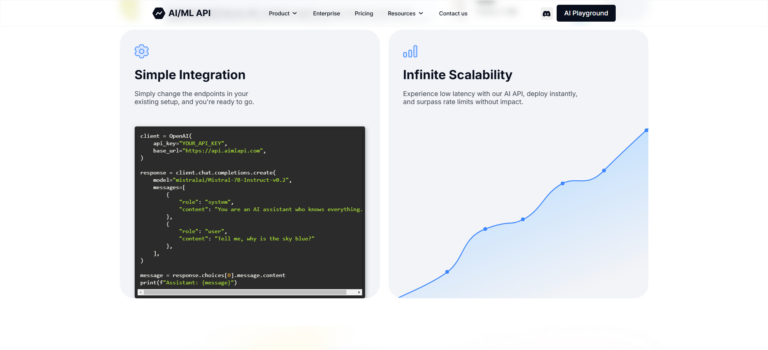
AIML API Integration and Compatibility
AIML API is designed to integrate seamlessly with various tools and platforms, making it a versatile choice for developers and businesses. Here’s how it achieves this:
Easy Integration
AIML API offers a straightforward integration process that minimizes the need for extensive changes to existing systems. This is particularly beneficial for developers who are already using OpenAI services, as the API is compatible with OpenAI’s structure. This compatibility allows for a smooth transition with minimal code adjustments, often requiring just a single line of code change.
Platform Compatibility
The API is accessible across multiple platforms, including Windows, Mac, and web applications. This broad compatibility ensures that developers can use AIML API in various environments without worrying about platform-specific limitations.
Serverless Infrastructure
The serverless architecture of AIML API reduces the complexity involved in managing servers. It allows developers to focus on building applications rather than handling backend infrastructure. This setup also supports scalability, enabling the API to handle increased loads efficiently without performance degradation.
Secure Authentication
AIML API uses secure authentication methods via API keys, ensuring that integrations are protected against unauthorized access. This security measure is crucial for maintaining data integrity and privacy across different platforms and devices.
AI Playground
The AI Playground feature allows users to test and experiment with models in a sandbox environment before full deployment. This capability is useful for verifying model performance and compatibility with specific applications without affecting live systems.
Real-time Tracking
Developers can monitor API usage and performance through real-time analytics. This feature helps in managing costs effectively and optimizing resource allocation, which is especially important when integrating AI into existing workflows.
Overall, AIML API’s integration capabilities are designed to be flexible and user-friendly, supporting a wide range of platforms and ensuring that developers can incorporate advanced AI functionalities into their projects with ease.

AIML API Customer Support and Resources
AIML API offers a range of customer support options and resources to help users get the most out of their service. Here’s a breakdown of what they provide:
Customer Support Channels
AIML API provides multiple ways to get help:
- Email Support: Users can reach out via email for general inquiries and non-urgent issues.
- Live Chat: A real-time chat option is available for quick questions and immediate assistance.
- Documentation: Comprehensive guides and API references are available online.
The support team is known for being responsive, with most queries addressed within 24 hours.
AI/ML API Academy
One standout feature is the AI/ML API Academy. This resource offers:
- Tutorials: Step-by-step guides for beginners and advanced users.
- Best Practices: Tips on optimizing API usage and improving performance.
- Use Case Examples: Real-world applications to inspire and guide developers.
The Academy is a valuable tool for users looking to expand their knowledge and skills with the platform.
Documentation
AIML API provides detailed documentation covering:
- API endpoints and parameters
- Code samples in various programming languages
- Troubleshooting guides
- FAQs addressing common issues and questions
While generally good, some users have mentioned that the documentation could be more comprehensive for advanced use cases.
Community Forums
AIML API hosts a community forum where users can:
- Share experiences and tips
- Ask questions and get answers from peers
- Discuss best practices and innovative uses of the API
This peer-to-peer support can be invaluable for solving unique challenges.
Regular Updates
The team provides:
- Release notes for new features and updates
- Blog posts discussing industry trends and API improvements
- Email newsletters keeping users informed about platform changes
These updates help users stay current with the rapidly evolving AI landscape.
Personal Support for Enterprise Clients
Enterprise plan subscribers benefit from:
- A dedicated account manager
- Priority support with faster response times
- Custom onboarding and training sessions
This personalized approach ensures that large-scale users get the support they need to maximize their investment.
Resource Library
AIML API maintains a resource library containing:
- Whitepapers on AI/ML topics
- Case studies showcasing successful implementations
- Webinars and video tutorials
These resources provide deeper insights into AI technologies and their practical applications. While AIML API’s support and resources are generally comprehensive, there’s always room for improvement.
Some users have expressed a desire for more advanced troubleshooting guides and expanded language support for non-English speakers. Despite these minor areas for growth, the overall support ecosystem is robust and designed to help users at all levels of expertise make the most of the platform.
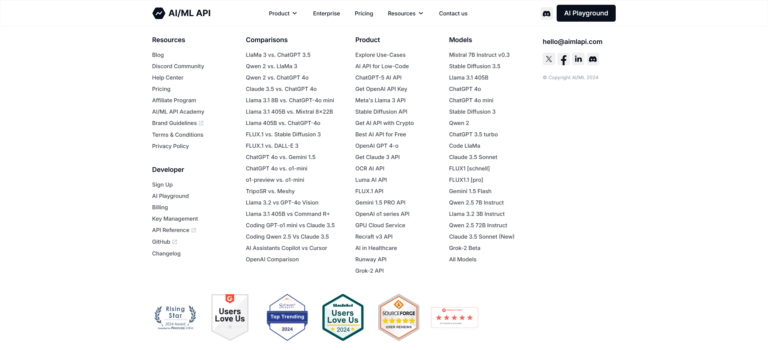
AIML API Pros and Cons
Pros
- Wide Model Selection: AIML API offers access to over 100 AI models, covering a broad range of applications from chat and language processing to image generation and code assistance.
- Cost-Effective: The platform claims to offer the lowest rates in the market, making advanced AI technology more accessible to businesses of all sizes.
- OpenAI Compatibility: AIML API is designed to be compatible with existing OpenAI applications, allowing for easy transition with minimal code changes.
- Serverless Infrastructure: The serverless architecture eliminates the need for server management, reducing operational costs and simplifying deployment.
- High Performance: AIML API boasts 99% uptime and claims to be three times faster than standard APIs, ensuring reliable and swift performance.
- Transparent Pricing: The platform offers a straightforward pricing structure with predictable costs, helping businesses budget effectively.
- Real-Time Analytics: Users can track API calls and token usage in real-time, allowing for better resource management and cost optimization.
Cons
- Technical Knowledge Required: While user-friendly, the API still requires some technical expertise to integrate and utilize efficiently.
- Limited Free Options: AIML API doesn’t offer a free version, which might be a barrier for individual developers or small projects looking to experiment.
- Potential Data Privacy Concerns: As with any cloud-based service handling potentially sensitive data, users need to be mindful of data privacy and security measures.
- Dependency on Third-Party Models: The reliance on various AI models means that the quality and availability of these models can impact the overall service.
- Learning Curve: Despite OpenAI compatibility, users unfamiliar with AI APIs might face a learning curve in effectively utilizing all features.
- Usage Limits: The token limits on different plans might restrict usage for high-volume applications, requiring upgrades to more expensive tiers.
- Evolving Technology: In the rapidly changing field of AI, there’s always a risk of newer, more advanced solutions emerging, potentially outpacing current offerings.
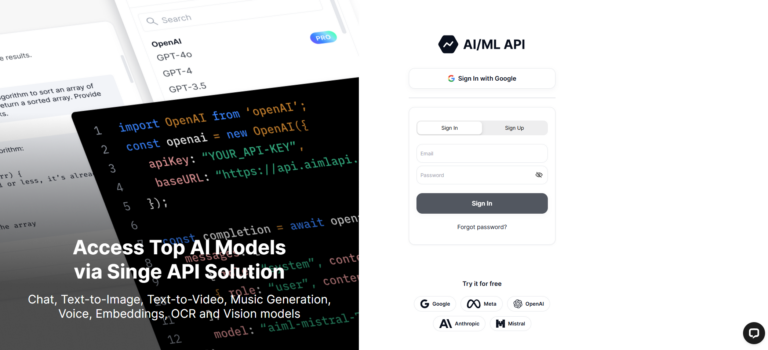
AIML API Comparison with Competitors
AIML API vs OpenAI API:
- AIML API offers access to over 100 AI models, while OpenAI focuses on its own advanced models like GPT-3 and GPT-4.
- AIML API claims to be more cost-effective, offering GPT-4 level accuracy at up to 80% less cost.
- AIML API has fewer usage restrictions compared to OpenAI’s specific application policies.
- OpenAI has a stronger research focus and more seamless developer interface.
AIML API vs AI Inferkit:
- AI Inferkit specializes in advanced AI text generation using deep learning and NLP.
- AIML API offers a broader range of AI models beyond text generation.
- AI Inferkit provides customizable prompts for tailored content and supports diverse text formats.
AIML API vs Awan LLM:
- Awan LLM offers unlimited token generation with a monthly subscription model.
- AIML API focuses on providing access to multiple models rather than unlimited usage of a single model.
- Awan LLM emphasizes privacy and owns its data centers.
AIML API vs Amazon AWS AI Services:
- AWS offers a more comprehensive cloud ecosystem with services like Amazon SageMaker and Amazon Bedrock.
- AIML API provides a simpler, more focused AI model access solution.
- AWS has enterprise-grade security and extensive scalability options.
AIML API vs Cohere:
- Cohere specializes in customizable models for specific tasks like text classification and summarization.
- AIML API offers broader model access without the depth of customization.
- Cohere features retrieval-augmented generation (RAG) for improved accuracy and context.
Unique features of AIML API:
- Serverless infrastructure, reducing operational costs and simplifying deployment.
- OpenAI compatibility, allowing easy transition for existing OpenAI users.
- Access to a wide range of open-source models like Mixtral AI, LLaMA, and Stable Diffusion.
- Claims to offer the lowest rates in the market with a straightforward pricing structure.
Potential alternatives:
Depending on specific needs, users might consider OpenAI for cutting-edge language models, AWS for enterprise-scale AI integration, Cohere for highly customizable NLP tasks, or Awan LLM for unlimited token generation.

AIML API Frequently Asked Questions
AIML API is a centralized platform that provides access to over 100 AI models through a single, easy-to-use API. It is designed for developers and businesses looking to integrate artificial intelligence capabilities into their applications without the complexity of managing multiple APIs or models. The platform supports a wide range of functionalities, including chat, image generation, coding assistance, and more.
AIML API offers seamless integration with existing OpenAI applications, allowing developers to switch with minimal code changes. The API is compatible with various platforms, including Windows, Mac, and web applications. It uses secure authentication methods via API keys to ensure safe integration.
Key features of AIML API include access to a diverse library of AI models, serverless infrastructure for reduced operational costs, real-time tracking of API usage, and compatibility with OpenAI's structure. The platform also provides an AI Playground for testing models in a sandbox environment before deployment.
AIML API offers several pricing plans:
- Start-Up Plan: $4.99 per week for 10 million tokens.
- Growth Plan: $99.50 per month for 200 million tokens.
- Enterprise Plan: $999.50 per month for 2 billion tokens.
These plans are designed to cater to different business needs and budgets, with no free version available but a free trial offered.
AIML API provides several customer support channels, including email support, live chat for immediate assistance, and comprehensive documentation online. Enterprise clients receive additional benefits like a dedicated account manager and priority support.
AIML API is suitable for a wide range of businesses, including freelancers, startups, small to medium-sized businesses (SMBs), mid-market companies, and large enterprises. It is particularly beneficial for those looking to incorporate AI into their operations efficiently and cost-effectively.
The platform prioritizes data security by implementing industry-standard encryption protocols and compliance measures to safeguard user data and privacy. This ensures that sensitive information remains protected throughout the integration process.
Yes, AIML API offers an AI Playground feature that allows users to test and experiment with different models in a sandbox environment before full deployment. This helps ensure that the chosen model fits the specific use case and reduces integration risks.

AIML API Conclusion and Recommendation
AIML API stands out as a versatile and cost-effective solution for businesses and developers looking to harness the power of AI. Its strengths lie in its wide range of available models, competitive pricing, and user-friendly integration process. The platform shines in its ability to provide access to over 100 AI models through a single API. This feature alone makes it an attractive option for developers who want to experiment with different AI capabilities without managing multiple integrations. The OpenAI compatibility is a significant plus, allowing for an easy transition for those already familiar with that ecosystem.
AIML API’s serverless infrastructure is a game-changer for many. It removes the headache of server management, allowing teams to focus on building great applications rather than worrying about backend logistics. This, coupled with their claims of high performance and uptime, makes it a reliable choice for businesses of all sizes.
The pricing structure is another strong point. With plans catering to different scales of operation and the claim of offering the lowest rates in the market, AIML API makes advanced AI technology accessible to a broader range of users. The real-time tracking of API usage is a valuable tool for managing costs and optimizing resource allocation.
However, it’s important to note that AIML API isn’t without its limitations. The lack of a free tier (beyond the limited free trial) might be a barrier for individual developers or small projects looking to experiment extensively before committing. Additionally, while the documentation is generally good, some users have expressed a desire for more comprehensive guides for advanced use cases.
Who would benefit most?
- Startups and SMBs looking to incorporate AI capabilities without breaking the bank.
- Developers transitioning from OpenAI who want a smoother, potentially more cost-effective alternative.
- Businesses requiring access to a wide range of AI models through a single, manageable API.
- Companies seeking a scalable AI solution that can grow with their needs.
- Teams that want to focus on application development without the overhead of managing AI infrastructure.
Overall Recommendation
AIML API is a solid choice for businesses and developers looking to integrate AI capabilities into their projects efficiently and cost-effectively. Its broad model selection, competitive pricing, and ease of use make it a strong contender in the AI API market. For those already using OpenAI, the transition to AIML API could be particularly smooth and potentially more economical.
The platform’s scalability also makes it suitable for growing businesses that anticipate increasing AI needs over time. However, for enterprises with very specific or complex AI requirements, or those needing extensive customization, it may be worth exploring more specialized solutions alongside AIML API.
In conclusion, AIML API is recommended for its balance of functionality, affordability, and ease of use. It’s particularly well-suited for businesses looking to dip their toes into AI or expand their existing AI capabilities without committing to a more complex or expensive solution. As with any technology decision, it’s advisable to take advantage of the free trial to ensure it meets your specific needs before fully committing.
